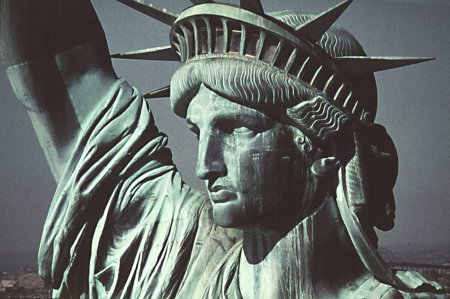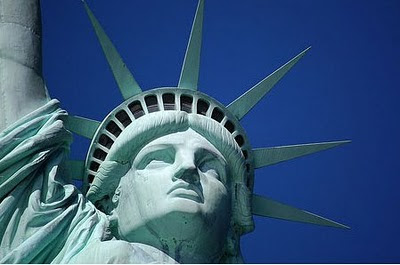All Things


-
Live Free or Die? The obituary for Gabriel Garcia Marquez mentioned in passing that until the 1990s and the presidency of Bill Clinton, the State Department refused visas to the Mexican author because he had at one time been associated with a Communist...
-
How secure are we? – 2 Authoritarian governments have always told their subjects that the government's coercive and violent acts were necessary in order to protect the people. The inquisition protected the faithful against helpers of the Devil....
-
Yes, it's a relief but… Like so many other Americans I was very afraid of four years under the leadership of a cynical, callous capitalist like Mitt Romney whose only real interest is piling up more money at the expense of American working...
-
Whatever happened to the Rule of Law? About half the first ten Amendments to the Constitution have to do with the rights of persons suspected of having committed a crime. The 4th amendment protects against unreasonable search and seizure. If the police...
- Is Government The Enemy?
Many Americans think that. On April 15, tax day, a national organization held a series of “tea parties”all over the country to commemorate the colonists' resistance to government and specifically to taxation. They are planning more events for...
All Things


Freedom needs to be defended every day.
“We have freedom” President Bush used to say, echoing the opinion of many Americans. Freedom, they think, is a permanent and solid possession. We have freedom just as we have noses in our faces.
Others have a more complex view. We have freedom, they say, because we have our Constitution.
But the Constitution is a document. The original is written on parchment. Copies are printed on paper or can be read on the Internet. How can a piece of paper make us free men or women?
The answer is, of course: It cannot make us free. Notoriously, the Constitution of the former Soviet Union guaranteed all the liberties guaranteed by our constitution. But that did not make that country any less of a police state. Closer to home, our constitution was in force for almost one hundred years while most African-Americans were enslaved, to be sold in the market like so much cattle. The Constitution did not assure them their freedom.
Instead they and many Americans, not enslaved, needed to fight for it. When, at the end of the Civil War, we added three further amendments to the Constitution assuring everyone—of whatever origins-- equal rights as citizens, African Americans still suffered second class status. In many states they were not allowed to vote. They were kept poor and suffered many indignities.
All that changed because they fought for their liberties for another 100 years.
The lesson is unambiguous: people are free only if they are prepared to defend their liberties. We are free because many people continue to challenge government encroachments on the freedoms of citizens. This morning's paper alone had five stories about Americans fighting to preserve their—and our-- freedoms.
The first case is particularly instructive. In 2000 the citizens in Massachusetts added a provision to their constitution that deprived imprisoned felons of their right to vote. 60% of voters supported the amendment. One third of the voters did not. Is this limitation of liberty legitimate? One third of Massachusetts voters did not think so. But it is now included in the constitution of the state of Massachusetts as well as of most other states. Only in Maine and Vermont are imprisoned felons allowed to vote.. Even constitutions may perpetuate injustices. Constitutions do not always defend liberty.
Several of the cases concerning people defending their liberties concern the suspicion that someone is being railroaded by police and politically powerful persons. A Boston City Councillor is in court accused of taking a bribe. The prosecution witness was paid $ 30,000 by the FBI. Is such a witness reliable?
In another case, four men accused of plotting to blow up a synagogue and shooting down planes, were clearly urged on by a paid informant who convinced them that he was a terrorist. The informant supplied the weapons. Fortunately they were dummies. The conspirators apparently were sufficiently feckless to be unable to tell real from phony weapons. The informant was instrumental in hatching this plot. Were they railroaded? A jury in New York City did not think so, but the question is clearly legitimate.
In a fourth case, a native Kansan, college football player, who later converted to Islam was arrested soon after 9/11 as a possible material witness. So were 70 other persons. They were strip searched and held in shackles for two weeks or more and saw their lives seriously restricted for the next year. Most of them were never called as witnesses. Many of them are now suing the government for illegal imprisonment.
Finally, The American Civil Liberties Union of Vermont is in court to find out how the State of Vermont uses cellphones to keep track of citizens. In criminal investigations the state uses cell phones to track people but no one knows how many people are being followed, or whether the state is keeping tabs on innocent citizens.
These cases involve voting rights, protection against railroading by police, protection against illegal imprisonment and government violation of citizens' privacy. These are important issues. These challenges to government actions all occurred on one and the same day.
Our freedoms are not secure. There is a constant to-and-fro between government, as well as private parties, infringing on the liberties of citizens and citizens who are trying to defend their liberties. Sometimes they win; often the government has the upper hand. Whatever the outcome, there are brave citizens who are aware of the threats to our freedoms and are willing to defend them.
We owe them a debt of gratitude. We should be ready, if necessary, to emulate them.
-
Live Free or Die? The obituary for Gabriel Garcia Marquez mentioned in passing that until the 1990s and the presidency of Bill Clinton, the State Department refused visas to the Mexican author because he had at one time been associated with a Communist...
-
How secure are we? – 2 Authoritarian governments have always told their subjects that the government's coercive and violent acts were necessary in order to protect the people. The inquisition protected the faithful against helpers of the Devil....
-
Yes, it's a relief but… Like so many other Americans I was very afraid of four years under the leadership of a cynical, callous capitalist like Mitt Romney whose only real interest is piling up more money at the expense of American working...
-
Whatever happened to the Rule of Law? About half the first ten Amendments to the Constitution have to do with the rights of persons suspected of having committed a crime. The 4th amendment protects against unreasonable search and seizure. If the police...
- Is Government The Enemy?
Many Americans think that. On April 15, tax day, a national organization held a series of “tea parties”all over the country to commemorate the colonists' resistance to government and specifically to taxation. They are planning more events for...
